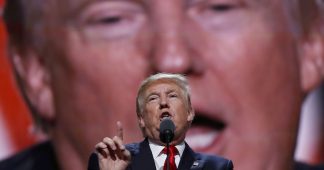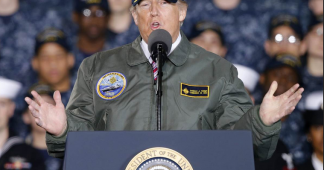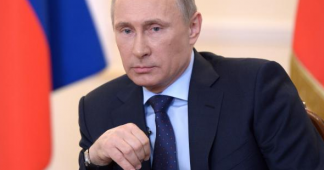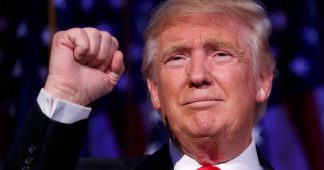By Patrick Martin
10 May 2017
The surprise firing of FBI Director James Comey, announced late Tuesday afternoon, is a sign of a deep and intensifying crisis of the Trump administration. Trump’s firing of Comey smacks of desperation on the part of a White House under siege.
The firing sparked widespread condemnation by Democrats and some Republicans, along with demands for the appointment of a special prosecutor or independent commission to investigate charges of collusion between the Trump campaign and the Russian government during the 2016 election campaign.
Powerful sections of the US ruling elite are moving against the Trump White House, which is so steeped in corruption that any one of a series of scandals, not just the investigation into alleged Russian interference in the 2016 elections, could leave it politically crippled.
There were numerous media comparisons to the “Saturday Night Massacre” during the Watergate scandal of 1973–74, when the attorney general and deputy attorney general resigned rather than carry out orders from President Richard Nixon to dismiss special Watergate prosecutor Archibald Cox. That effort to torpedo an investigation failed: ten months later, Nixon was forced to resign as president.
Unlike Watergate, however, there is no democratic principle being asserted, even in a limited fashion, by the Democratic Party opponents of the Trump administration. This is a conflict within the US ruling elite and its military-intelligence apparatus, driven largely by differences over foreign policy.
No significant evidence has been produced in support of the allegations of Russian interference in the 2016 US elections. The real purpose of the campaign of Russia-baiting is to push the Trump administration into a more confrontational foreign policy in Syria, Central Asia, North Africa and Eastern Europe, where US imperialism regards Moscow as its principal obstacle.
Trump has attempted to satisfy these concerns with last month’s missile strikes against Syria and a harsher rhetorical line towards Iran and Russia, but the divisions persist, as shown in the hearing Monday before a subcommittee of the Senate Judiciary Committee. (see: “Senate hearing revives Democratic campaign over alleged Trump-Russia connections”)
The circumstances surrounding Trump’s decision to fire Comey remained murky Tuesday night, with the White House withholding further comment following the announcement of Comey’s firing at 5:41 p.m. Press reports suggest that the decision had been in preparation for at least a week, and that Deputy Attorney General Rod Rosenstein, who took office on April 26, had been commissioned to provide a rationale.
The New York Times reported on its website, “Senior White House and Justice Department officials had been working on building a case against Mr. Comey since at least last week, according to administration officials. Attorney General Jeff Sessions had been charged with coming up with reasons to fire him, the officials said.”
The argument for the firing elaborated in a three-page memorandum prepared by Rosenstein has no credibility. The memo focuses on Comey’s decisions about the investigation into Democratic presidential candidate Hillary Clinton, condemning him not for the substance of the decision that there was no crime to prosecute, but for holding a press conference to announce that decision and proceeding to attack Clinton’s conduct as “extremely careless.” The memo also criticizes Comey for the October 28 letter in which he informed Congress that the FBI was reopening the Clinton investigation, only 11 days before Election Day.
Trump’s expressed opinions are the direct opposite of the Rosenstein memorandum. Last July, he denounced Comey’s decision not to prosecute Clinton, while “lock her up” became a standard chant at Trump rallies and at the Republican National Convention. Later, Trump hailed the October 28 letter as an action in which Comey “showed guts.”
Earlier this week, Trump tweeted that Comey had been “the best thing that ever happened to Hillary Clinton,” and that his decision on the email server prosecution was “a free pass for many bad deeds.”
There are further contradictions. Attorney General Jeff Sessions declared during his confirmation hearing that he would recuse himself from any actions relating to the case against Clinton, because of his own role in the Trump election campaign. Yet he has now countersigned the decision to fire Comey, supposedly because of the FBI director’s actions in the Clinton investigation.
Sessions also said that he would recuse himself from decisions related to the ongoing investigation into possible collaboration between the Trump campaign and alleged Russian hacking of the Democratic National Committee and Clinton campaign chairman John Podesta. The firing of Comey removes the head of the agency conducting that investigation.
It is absurd to suggest that Trump fired Comey for his transgressions against Hillary Clinton, particularly when he has attacked the FBI director for going easy on her. Moreover, all the events cited in the Rosenstein memo took place before the 2016 election, while Trump reiterated his support for Comey continuing in office—he was serving a fixed ten-year term until 2023—as recently as February.
What has changed in the interim? On March 20, at a nationally televised House Intelligence Committee hearing, Comey confirmed for the first time that the FBI has opened an investigation into possible connections between the Trump campaign and alleged Russian interference in the 2016 elections.
Since then, a series of former campaign advisers and aides has been interrogated by the FBI, each undoubtedly pressured to save their own skins at the expense of those higher up, in a chain leading inexorably to Trump himself.
Most serious appears to be the attention given to Trump’s former national security adviser, retired Lt. Gen. Michael Flynn, who has been publicly accused of failing to report significant income from individuals and businesses linked to Russia, and who was so close to Trump that he was actively considered as a possible running mate.
The extreme sensitivity in the White House to Comey’s role in the Russia investigation was indicated in the second paragraph of the official letter from Trump to Comey informing him of his dismissal. “While I greatly appreciate you informing me, on three separate occasions, that I am not under investigation, I nevertheless concur with the judgment of the Department of Justice that you are not able to effectively lead the bureau,” Trump wrote.
The White House apparently informed only a handful of congressional leaders ahead of the firing, including Senators Lindsey Graham and Dianne Feinstein, the top Republican and Democrat on the Senate Judiciary Committee subcommittee that oversees the FBI. Graham publicly endorsed the firing, while Feinstein did not oppose it.
Among other Democratic senators and congressmen, however, there was near-unanimous opposition.
Senate Democratic Whip Richard Durbin of Illinois, speaking on the Senate floor, condemned the firing. “Any attempt to stop or undermine this FBI investigation would raise grave constitutional issues,” he said. “We await clarification by the White House as soon as possible as to whether this investigation will continue and whether it will have a credible lead so that we know that it’ll have a just outcome.”
Senate Minority Leader Charles Schumer noted Trump’s firing of acting attorney general Sally Yates, US Attorney Preet Bharara and now Comey, saying on Twitter, “If we don’t get a special prosecutor, every American will rightfully suspect that the decision to fire Comey was part of a cover-up.”
Even more significant were the statements from two leading Republican senators. Senator Richard Burr of North Carolina, chairman of the Intelligence Committee, which is conducting an investigation into the Russian hacking allegations, declared, “I am troubled by the timing and reasoning of Jim Comey’s termination. I have found Director Comey to be a public servant of the highest order.”
Senator John McCain, former presidential candidate and chairman of the Armed Services Committee, reiterated his support for a special investigating committee. “I have long called for a special congressional committee to investigate Russia’s interference in the 2016 election,” he said in a statement. “The president’s decision to remove the FBI director only confirms the need and the urgency of such a committee.”











